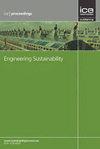Co-creating social value in placemaking: the grand balancing act
IF 1.5
4区 工程技术
Q3 ENGINEERING, CIVIL
Proceedings of the Institution of Civil Engineers-Engineering Sustainability
Pub Date : 2021-10-18
DOI:10.1680/jensu.21.00046
引用次数: 1
Abstract
Social value in the built environment refers to the social impact any organisation or project in that sector makes to its many and varied stakeholders. This involves different agents, such as design and planning professionals, engineering and construction professionals and workers, trades, facilities management providers and their personnel, and community groups and their members. We examine social value activities with a focus on placemaking, and show how in the Midlands, UK, regional strategic influence, consultant, design, and planning efforts relate to the Useful Projects Social Value Maturity Framework and align with the UN Sustainable Development Goals (SDGs). We highlight how the agents collectively help ensure that Nottingham is one exemplar city with a direct participation structure of civil society in urban planning and management that operates regularly and democratically; how their activities help improve education, awareness-raising and human and institutional capacity on climate change mitigation, adaptation, impact reduction and early warning; and how they together ensure responsive, inclusive, participatory and representative decision-making at all levels. We present a transformative case study of social value in practice, which has a partnerships model at its heart, and the potential to inform future methodologies for business and community engagement to improve social outcomes.在场所营造中共同创造社会价值:宏大的平衡行为
建筑环境中的社会价值是指该领域的任何组织或项目对其众多不同的利益相关者产生的社会影响。这涉及不同的代理人,例如设计和规划专业人员、工程和建筑专业人员和工人、行业、设施管理提供者及其人员、社区团体及其成员。我们研究了社会价值活动,重点是场所营造,并展示了英国中部地区的区域战略影响、咨询、设计和规划工作如何与有用项目社会价值成熟度框架相关,并与联合国可持续发展目标(SDGs)保持一致。我们强调这些机构如何共同帮助确保诺丁汉成为一个模范城市,其公民社会直接参与城市规划和管理的结构,并定期和民主地运作;它们的活动如何帮助改善气候变化减缓、适应、减少影响和预警方面的教育、提高认识以及人和机构的能力;以及它们如何共同确保各级决策的响应性、包容性、参与性和代表性。我们提出了一个实践中社会价值的变革性案例研究,其核心是伙伴关系模型,并有可能为未来的商业和社区参与方法提供信息,以改善社会成果。
本文章由计算机程序翻译,如有差异,请以英文原文为准。
求助全文
约1分钟内获得全文
求助全文
来源期刊

Proceedings of the Institution of Civil Engineers-Engineering Sustainability
ENGINEERING, CIVIL-ENGINEERING, CIVIL
CiteScore
3.70
自引率
16.70%
发文量
44
审稿时长
>12 weeks
期刊介绍:
Engineering Sustainability provides a forum for sharing the latest thinking from research and practice, and increasingly is presenting the ''how to'' of engineering a resilient future. The journal features refereed papers and shorter articles relating to the pursuit and implementation of sustainability principles through engineering planning, design and application. The tensions between and integration of social, economic and environmental considerations within such schemes are of particular relevance. Methodologies for assessing sustainability, policy issues, education and corporate responsibility will also be included. The aims will be met primarily by providing papers and briefing notes (including case histories and best practice guidance) of use to decision-makers, practitioners, researchers and students.
 求助内容:
求助内容: 应助结果提醒方式:
应助结果提醒方式:


